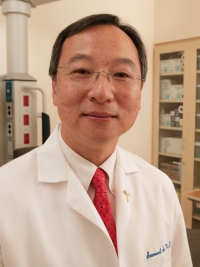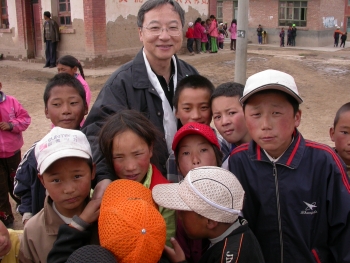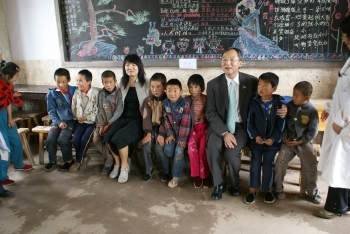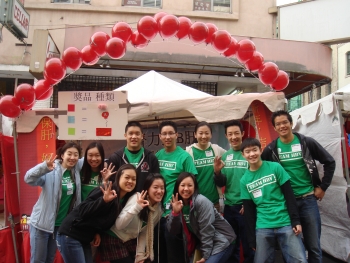Passionate About Preventing
Hepatitis B
Samuel So, MD started as a pediatric transplant surgeon in the Midwest over 20 years ago. At that time, he was driven to demonstrate the value of kidney transplants in children when fewer than 2% of transplants in these patients were successful. Sam was able to show that kidney transplants improve mental development, increase growth overall, and reduce early cancer in kids. He moved to the West coast about 15 years ago. (According to one source, in search of better Chinese food.) It was in his practice in San Francisco that he began to notice that his Asian patients were dying from liver disease.
Hepatitis B - Leading Cause of Liver Cancer and Cirrhosis in Asians

The rate of hepatitis B in foreign-born Asians in San Francisco is 1 in 10, compared with 1 in 1000 in Caucasian Americans. According to Dr. So (who prefers to be called Sam), "In most Asian persons, the virus is transmitted at birth from the mother," and people don't realize they are infected until they become severely ill.
Sam says that there is a huge misconception that Asians don't do well after liver transplant and that this information was based on a retrospective study. He conducted epidemiological studies that now refute this data. The data indicate that Asian transplant patients do just as well or better than other liver transplant patients, because the Asian hepatitis B population tends to be very compliant with the post-transplant immunosuppressant therapies.
Asian persons who are foreign born are at the greatest risk of being infected with hepatitis B because of a lack of immunization at birth, which Sam refers to as their "birth dose." Babies that need to wait 6 weeks for the initial vaccination may become infected during this wait time. Sam refers to those children under 5 years who have delayed immunization as needing "catch up" doses.

Hepatitis B vaccination is a series of three injections with specific passage of time between shots to allow the body to develop immunity. The first dose for newborns should be administered soon after birth, ideally before the mother takes the child home. Although the US now has a policy where all children are offered the birth dose of hepatitis B vaccine, many countries do not, or parents need to pay. The vaccination is inexpensive by American standards (less than $1 per dose), but the relative cost for many families in countries such as China can be exorbitant.
Adults Also Need Vaccination
Sam commends the Centers for Disease Control and Prevention (CDC) on its efforts to immunize children against hepatitis B. However, he feels that the CDC has overlooked the need to stress immunization of adults, especially those of Asian descent. He notes that there is a big movement in the US to immunize newborns, but pregnant mothers are not tested, nor are they offered hepatitis B vaccination. (You can read the updated US adult hepatitis B immunization recommendations here.)
In 1996, frustrated by his observations and the lack of attention to this health concern, Sam founded the Asian Liver Center at Stanford to promote public awareness of hepatitis B. Since that time the Asian Liver Center has become a national and international leader in the fight against hepatitis B and liver cancer.
He said that 25% of persons infected with hepatitis B die from complications secondary to liver disease or from liver cancer. He is saddened and frustrated when at least once a month he diagnoses a 30- to 35-year old person of Asian descent, with liver disease due to hepatitis B, who came to this country for a better life. One of the most difficult things he has to do is tell this young professional with children that his life expectancy is only 6 months.
Sam is passionate about making physicians aware that normal liver function tests do not necessarily mean that there is no infection. He insists that all Asians who have not been immunized should be screened for hepatitis.
Childhood Vaccination Is Vital

In 2003, the Chinese government developed a policy to provide all newborns with free hepatitis B vaccine, but it was discovered that doctors were charging patients. In 2005, the vaccination distribution was restructured to ensure that parents did not have to pay to immunize their children. Sam laments that today most children in China older than 5 years have never received hepatitis B vaccination.
The Asian Liver Center provides free screening for and education about hepatitis B to persons living in San Francisco and beyond. Sam has traveled to parts of China with the greatest burden of hepatitis B to provide catch up doses for children. In partnership with student interns and support of the local government, Sam was able to immunize over 100,000 preschool- and kindergarten-aged children with the entire hepatitis B series; this is referred to as the Qinghai Project.
Jade Ribbon Campaign
From the Asian Liver Center, the Jade Ribbon Campaign was born (now known as JoinJade. In order to have people worldwide unite against a disease you need a brand that people identify with. The idea for the Jade Ribbon Campaign came several years ago from an intern and a program manager at the Asian Liver Center, who were both recent Stanford graduates.

The Jade Ribbon Campaign is an outreach movement targeting family practice physicians. The message is, "Test all of your Asian and Pacific Islander patients for hepatitis B. A one-time, simple, and cheap screening blood test will stop a cycle of illness and death that systematically falls under the radar screen in this country." Considered to be the essence of heaven and earth, jade is believed in many Asian cultures to bring good luck and longevity while deflecting negativity. Folded like the Chinese character meaning "person" or "people," the Jade Ribbon symbolizes the united voices of those fighting hepatitis B and liver cancer worldwide.
Giant Healthcare Gap
Sam refers to the existence of a hepatitis B vaccine and the continued prevalence of the disease as a giant healthcare gap. He says, "Even though we have a very safe and effective vaccine for hepatitis B, we are not implementing an effective screening and vaccination program worldwide to eliminate this disease." He describes how millions of dollars are spent to save one life with a liver transplant, and is frustrated because three shots of a vaccine could have prevented the disease.
Sam understands that a barrier to vaccinating everyone is a lack of political and government support. To overcome this he is working with congress members Michael Honda (D-Calif) and Charlie Dent (R-Pa) to pass a bill to increase hepatitis B awareness in the US. In addition, he has partnered with the California Department of Health and the American Cancer Society, and he is leading a global hepatitis B initiative with the World Health Organization and CDC to spread the message, "Test, treat, vaccinate."
Doctor-Activist
Discrimination against persons infected with hepatitis B occurs for some in some Asian countries. Persons are denied work due to their hepatitis B status. Sam is working to remove hepatitis B testing as part of a job application or acceptance for work.
He explains that hepatitis B is 100 times more infectious than HIV, yet many countries spend millions of dollars to treat HIV, but far less for hepatitis B. He says that in some countries, insurance companies will pay for HIV treatment, but not for hepatitis B treatment.
The Future
Sam is hopeful that his message is getting out and more people are getting vaccinated. Thanks to Sam, California is the first state to have a liver cancer prevention plan. The plan calls for all Asians and Pacific Islanders to be tested and vaccinated against hepatitis B by 2010. Sam is actively working with the CDC and WHO towards the formation of a global hepatitis B initiative so that we can achieve the ultimate goal of global eradication.
If there is one message Sam wants heard, it is that, "All persons of Asian descent should be tested to determine if they have hepatitis. Those who test positive should be treated, and those who test negative should be vaccinated."
About the Author
Beatriz Manzor Mitrzyk, PharmD, is Clinical Assistant Professor and Assistant Research Scientist at the University of Michigan College of Pharmacy.
About Angels in Medicine
Angels in Medicine is a volunteer site dedicated to the humanitarians, heroes, angels, and bodhisattvas of medicine. The site features physicians, nurses, physician assistants and other healthcare workers and volunteers who reach people without the resources or opportunities for quality care, such as teens, the poor, the incarcerated, the elderly, or those living in poor or war-torn regions. Read their stories at www.medangel.org.